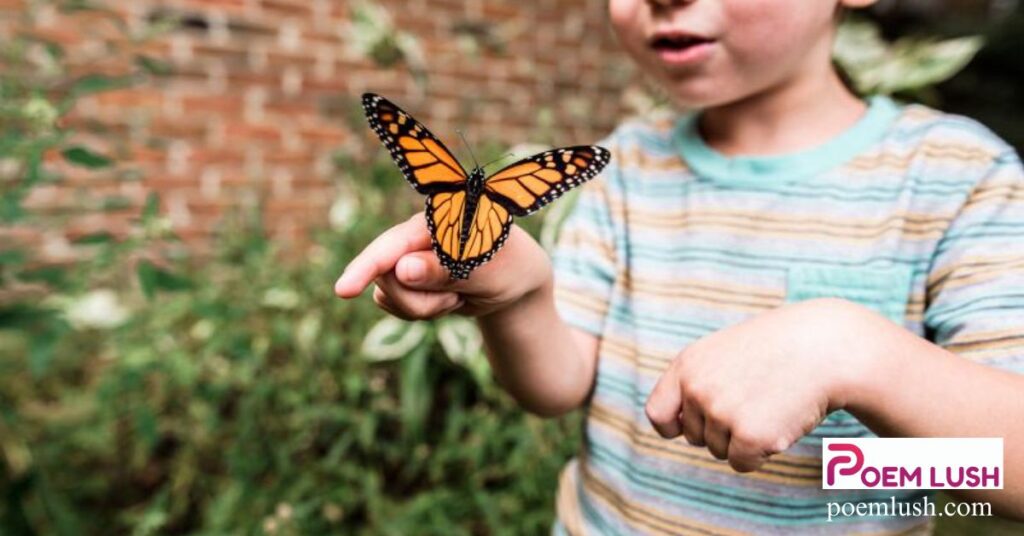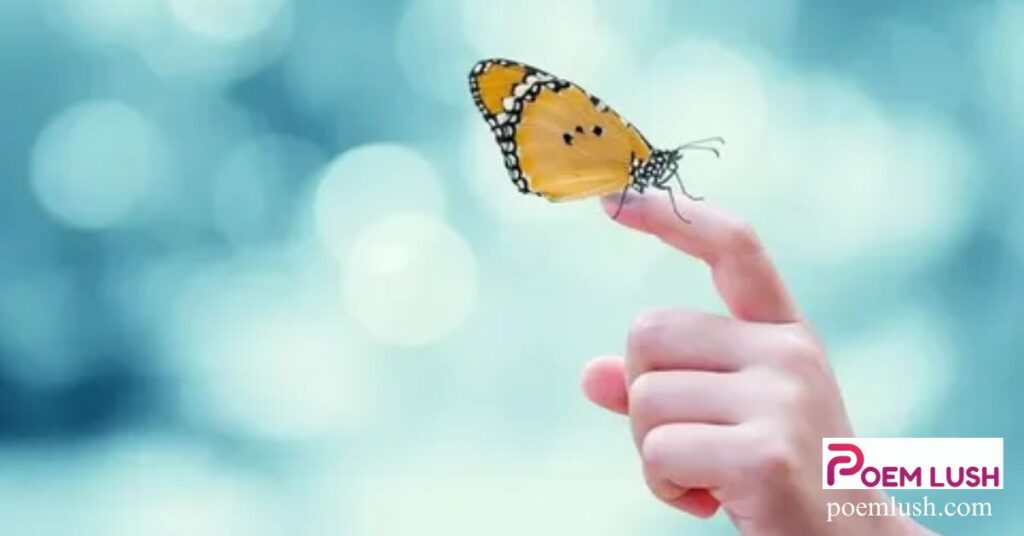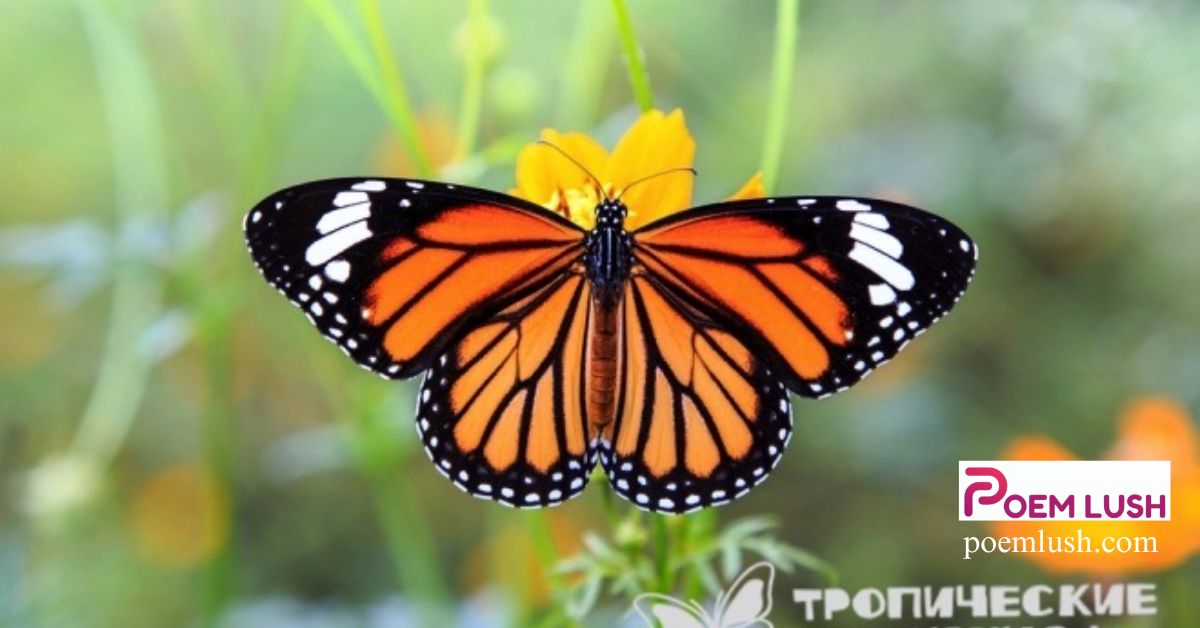Butterflies have long captivated poets with their delicate wings, graceful movements, and profound symbolism. Representing transformation, hope, fleeting beauty, and freedom, these winged wonders have inspired countless verses across cultures and centuries. From the ancient haiku of Basho to modern free verse, butterflies remain an enduring muse for poets worldwide.Poems About Butterflies
Why do we write so many poems about butterflies? The answer is simple—their elegance, metamorphosis, and ephemeral existence reflect themes that resonate deeply with human emotions and experiences. Let’s explore some of the most beautiful poems about butterflies and what makes them so special.Poems About Butterflies
Why Write Poems About Butterflies?

1. Transformation and Renewal
Butterflies are one of nature’s greatest symbols of change and personal growth. Their metamorphosis—from a humble caterpillar to a chrysalis and then to a dazzling butterfly—mirrors the journeys of resilience and rebirth in human life.
2. Ephemeral Beauty
Like poetry itself, butterflies are fleeting yet impactful. Their short lifespan reminds us to cherish every moment, much like the delicate lines of a well-crafted poem.
3. Freedom and Lightness
The way butterflies dance in the wind conveys a sense of freedom and joy. They inspire poets to write about liberation, adventure, and the beauty of the present moment.
4. Nature’s Artistry
With their intricate patterns and radiant hues, butterflies are like living paintings. They bring color to the world, just as poetry adds richness to language and emotions.Poems About Butterflies
Let’s delve into some wonderful butterfly poems that capture these ideas beautifully.
Classic and Contemporary Butterfly Poems
Sunlight passes
through a butterfly
asleep
This minimalist haiku captures the gentle stillness of a butterfly resting in sunlight, emphasizing nature’s quiet beauty.
Butterflies by C.W. Bryan
I knew a girl
once who had
a clothesline that ran
across her kitchen.
When she would water
her houseplants,
she could never remember
how much
water each one needed
to maintain a healthy
green glow.
She said, “I’d rather them
leak than go
thirsty.”
She placed neatly folded paper
towels beneath
each green roommate.
An hour after
each over-watering
she would
pick up the paper
towels, whispering
sweet words of encouragement
to each plant.
She would then stand
on a box of cat litter,
hanging each paper towel
up to dry,
from the kitchen
clothesline,
in the yellow, electric light.
I loved her once.
The way those towels
hung, limp, shifting
in the breeze
of drafty doors
reminded me
of butterflies.
This free verse poem offers a unique and deeply personal perspective on butterflies, using a powerful metaphor of hanging paper towels as delicate wings fluttering in a breeze.
Butterfly Haiku by Basho
Each time the wind blows
the butterfly sits anew
on the willow
Basho’s haiku captures the ever-changing nature of life through a butterfly’s gentle, restless movements.
Butterfly by Anna Elizabeth Bennett
With saffron sails unfurled,
A breathless butterfly
Steers out, the frailest navigation
Known upon the sky.
Embarking in the sun,
His moorings lost, an ell
of rhododendron petals back,
He tipsies like a bell.
Against the prickly lines of air
He quivers like a star,
And wind unloosed from follicle
Goes clambering up the spar.
He sees horizons coil
A thousand wings away,
And bees lurch down the pulsing waves
Of a diminished day.
The trees slip purple gloves
Upon their emerald hands,
And labyrinths of light removed
And folded on the sands.
Astride and ether-span
He teeters in delight,
And nosing into silver port
Throws anchor for the night!
This vivid poem paints a breathtaking picture of a butterfly’s whimsical journey, using elegant imagery and lyrical rhythm.Poems About Butterflies
More Butterfly Poetry and Reflections
Aside from traditional poetry, butterflies have also inspired famous quotes, fables, and legends. Here are a few timeless quotes about butterflies:
- “Just when the caterpillar thought the world was over, it became a butterfly.” — Anonymous
- “Happiness is like a butterfly. The more you chase it, the more it will elude you. But if you turn your attention to other things, it will come and sit softly on your shoulder.” — Henry David Thoreau
- “Butterflies are self-propelled flowers.” — R.H. HeinleinPoems About Butterflies
Butterflies in Poetry: Symbolism, Beauty, and Reflection
Butterflies have long been a symbol of transformation, fleeting beauty, and delicate resilience in literature. Many poets have captured their ethereal grace, using them as metaphors for change, freedom, and the ephemeral nature of life. Below are three remarkable poems that encapsulate the butterfly’s charm and deeper meaning through evocative imagery and poignant storytelling.Poems About Butterflies
Butterfly with Parachute by Stephanie Burt
A real butterfly wouldn’t need a parachute, but the one Nathan draws surely does. It comes to life on the page with four oblong shapes resembling popsicles—each vibrant and distinct in color: green apple, toasted coconut, and grape. Two per side, they float like billowing Valentine hearts, delicately framed by Scotch tape.Poems About Butterflies
If alive, it might defy gravity momentarily, hovering just above the floor, sustained by sheer imagination. As a paper airplane, it might glide a few extra moments before surrendering to the pull of the earth. This poem captures the essence of a child’s creativity—how imagination can breathe life into even the most improbable flight.Poems About Butterflies
One or Two Things by Mary Oliver
The butterfly’s loping flight
carries it through the country of leaves.
Delicate, yet determined, it moves well enough
to reach its unseen destination. It stops here and there,
pausing to drink from the damp throats of flowers,
to rest on black mud. Up and down, it swings—
frantic, aimless, and yet sometimes, in perfect moments,
it rides motionless on the breeze, as if savoring time.
The god of dirt whispered wisdom to me,
uttering truths in the voices of dogs, crows, frogs.
He said, “Now, now,” over and over,
never once mentioning forever.
Yet forever has always been there,
like a sharp iron hoof, pressing deep into my mind.
Only one or two things are needed
to traverse the sky, the trees, the stiff lightning-flowers:
a deep memory of pleasure,
a piercing knowledge of pain.
But to lift the hoof—
for that, you need an idea.
For years, I fought just to love my life.
Then, the butterfly rose weightless in the wind.
“Don’t love your life too much,” it whispered,
and vanished into the world.
Oliver’s poem is a meditation on existence. The butterfly’s journey mirrors our own—light, fleeting, purposeful yet aimless. The natural world speaks wisdom in the simplest terms, grounding us in the present while reminding us of life’s impermanence.Poems About Butterflies
The Butterfly’s Dream by Hannah F. Gould
A tulip, just opened, cradles a butterfly—
draped in gaudy colors, blissfully idle.
Rocked in a cradle of crimson and gold,
he lounges in comfort, careless and free.
As butterflies often do, he dreams.
Imagination soars beyond the stillness of petals.
His slumbering mind conjures a scene:
a hive bustling with tireless workers,
bees buzzing with purpose, industry in motion.
The butterfly scoffs, dismissing them
as mechanics, a rabble too low
to share his vibrant world of leisure.
“Begone, plebeians!” he commands in his sleep.
But the vision twists— The bees grow into an army, their wings immense,
a veil over the sky. Their eyes, burning embers.
Their hum, thunderous as war drums.
In a flash, they strike.
He tries to beg for mercy, but no sound comes.
His throne collapses, the tulip shattered.
Thunder cracks the heavens open; hail pelts the earth.
Jolted awake, he finds himself unprotected,
a victim of both nature and pride.
Battered, without solace,
he creeps away and perishes in silence.
Gould’s poem is a cautionary tale wrapped in delicate verse. The butterfly, wrapped in vanity and indolence, dismisses the diligent bees—only to realize, too late, the folly of arrogance. Nature humbles all, whether through storm or unseen consequences of pride.Poems About Butterflies
Expanded and Enriched Analysis of Butterfly Poems
Butterflies have long been a source of inspiration for poets, symbolizing transformation, fleeting beauty, and delicate grace. The following poems explore the essence of butterflies, weaving themes of nostalgia, resilience, and the ephemeral nature of life. Below is an extended analysis and appreciation of three classic butterfly poems: To a Butterfly by William Wordsworth, The Example by W.H. Davies, and The Butterfly Obtains by Emily Dickinson.Poems About Butterflies
To a Butterfly by William Wordsworth
I’ve watched you now a full half-hour;
Self-poised upon that yellow flower
And, little Butterfly! indeed
I know not if you sleep or feed.
How motionless!–not frozen seas
More motionless! and then
What joy awaits you, when the breeze
Hath found you out among the trees,
And calls you forth again.
This poem captures a moment of quiet contemplation as Wordsworth observes a butterfly perched upon a flower. The speaker’s patience reflects an appreciation for nature’s small wonders. The phrase “not frozen seas more motionless” emphasizes the stillness of the butterfly, likening it to a frozen landscape, creating a stark contrast with its inevitable movement once the breeze arrives. The poet marvels at the anticipation of motion, highlighting the interplay between stillness and change, a theme that mirrors the fleeting nature of childhood and memory.Poems About Butterflies
A Sanctuary in Nature
This plot of orchard-ground is ours;
My trees they are, my Sister’s flowers;
Here rest your wings when they are weary;
Here lodge as in a sanctuary!
Come often to us, fear no wrong;
Sit near us on the bough!
We’ll talk of sunshine and of song,
And summer days, when we were young;
Sweet childish days, that were as long
As twenty days are now.
Wordsworth invites the butterfly into his personal space, presenting his orchard as a haven, much like a childhood sanctuary. The passage evokes a deep sense of nostalgia, contrasting youthful perception—when time felt endless—with adulthood’s fleeting nature. The companionship between the poet, his sister, and the butterfly underscores the importance of cherishing simple moments.
Childhood Memories and the Passing of Time
Stay near me–do not take thy flight!
A little longer stay in sight!
Much converse do I find in thee,
Historian of my infancy!
Float near me; do not yet depart!
Dead times revive in thee:
Thou bring’st, gay creature as thou art!
A solemn image to my heart,
My father’s family!
Here, the butterfly transforms into a symbol of memory, bringing forth images of the poet’s past and family. The phrase “historian of my infancy” illustrates how small creatures can evoke deep-seated memories, acting as living connections to the past. The butterfly, lighthearted and delicate, paradoxically carries weighty emotional significance.
Oh! pleasant, pleasant were the days,
The time, when, in our childish plays,
My sister Emmeline and I
Together chased the butterfly!
A very hunter did I rush
Upon the prey:–with leaps and springs
I followed on from brake to bush;
But she, God love her, feared to brush
The dust from off its wings.
This closing stanza reminisces on childhood innocence, contrasting the poet’s youthful eagerness with his sister’s gentler nature. The phrase “feared to brush the dust from off its wings” suggests a sensitivity and reverence for the fragility of beauty, a lesson learned in hindsight.
The Example by W.H. Davies
Here’s an example from
A Butterfly;
That on a rough, hard rock
Happy can lie;
Friendless and all alone
On this unsweetened stone.
Now let my bed be hard
No care take I;
I’ll make my joy like this
Small Butterfly;
Whose happy heart has power
To make a stone a flower.
Davies presents the butterfly as a model of resilience, finding happiness even in desolate surroundings. The contrast between the hardness of the rock and the butterfly’s contentment serves as a metaphor for human endurance—happiness is not dictated by circumstances but by one’s perspective. The final line, “to make a stone a flower,” encapsulates the poem’s central message: the ability to transform hardship into something beautiful.
The Butterfly Obtains by Emily Dickinson

The butterfly obtains
But little sympathy
Though favorably mentioned
In Entomology —
Because he travels freely
And wears a proper coat
The circumspect are certain
That he is dissolute —
Had he the homely scutcheon
Of modest Industry
‘Twere fitter certifying
For Immortality —
Dickinson’s poem examines society’s biases, likening the butterfly’s beauty and freedom to perceived frivolity. The poet critiques the idea that only industrious creatures, like bees or ants, are valued. By challenging conventional values, Dickinson suggests that beauty, grace, and unrestrained movement hold their own merit, even if they defy rigid societal norms.
Are you looking for a conclusion for an article about “Poems About Butterflies”? If so, here’s a strong closing paragraph:
Conclusion
Poems about butterflies capture the delicate balance of transformation, freedom, and fleeting beauty. Whether symbolizing personal growth, the soul’s journey, or nature’s wonder, these verses inspire reflection and appreciation. From classic poets to modern wordsmiths, butterflies continue to flutter through literature, leaving behind messages of hope, renewal, and change. As you explore these poems, let their imagery remind you of life’s delicate yet profound moments—just like a butterfly’s brief but meaningful flight.
FAQs
What do butterflies symbolize in poetry?
Butterflies often symbolize transformation, beauty, freedom, and the fleeting nature of life. They are commonly used in poetry to represent personal growth, the soul, or the passage of time.
What are some famous poems about butterflies?
Some well-known poems featuring butterflies include “On a Butterfly Resting on a Skull” by Thomas Hardy, “The Butterfly” by Pavel Friedmann, and “To a Butterfly” by William Wordsworth. Many poets use butterflies to convey themes of change and mortality.
How can I write my own butterfly poem?
To write a butterfly poem, consider focusing on its graceful movement, delicate wings, or symbolic meaning. You can use vivid imagery, metaphors, and personification to bring the butterfly to life in your words.
Are butterfly poems always about nature?
While many butterfly poems celebrate nature and beauty, they can also explore deeper emotions like love, loss, and rebirth. Some poets use butterflies as a metaphor for personal transformation or fleeting happiness.
Where can I find inspiration for a butterfly poem?
Inspiration can come from observing butterflies in nature, reading classic poems, or reflecting on personal experiences. You might also draw from myths, dreams, or spiritual beliefs related to butterflies.


